The Dress Code for Muslim Women By Sheikh Nasir-ud-din Albaani
The Dress Code for Muslim Women By Sheikh Nasir-ud-din Albaani
Publisher:
Dar As Sunnah Publications
Author:
Sheikh Nasir-ud-din Albaani
Language:
English
Binding:
Soft Cover
Pages: 240
Size: A5 |5.8 x 8.3 in| 14.8x 21 cm
Couldn't load pickup availability
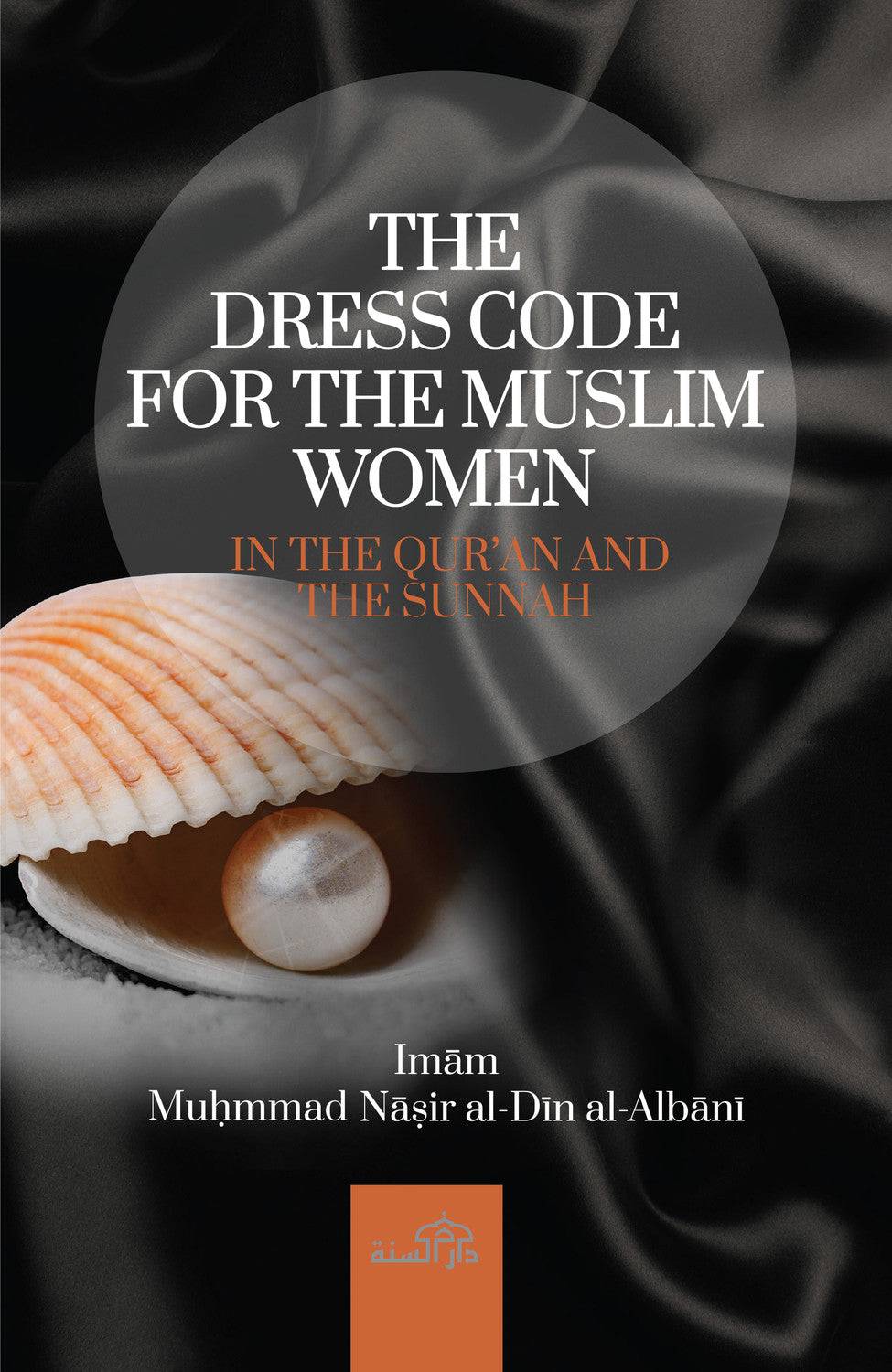
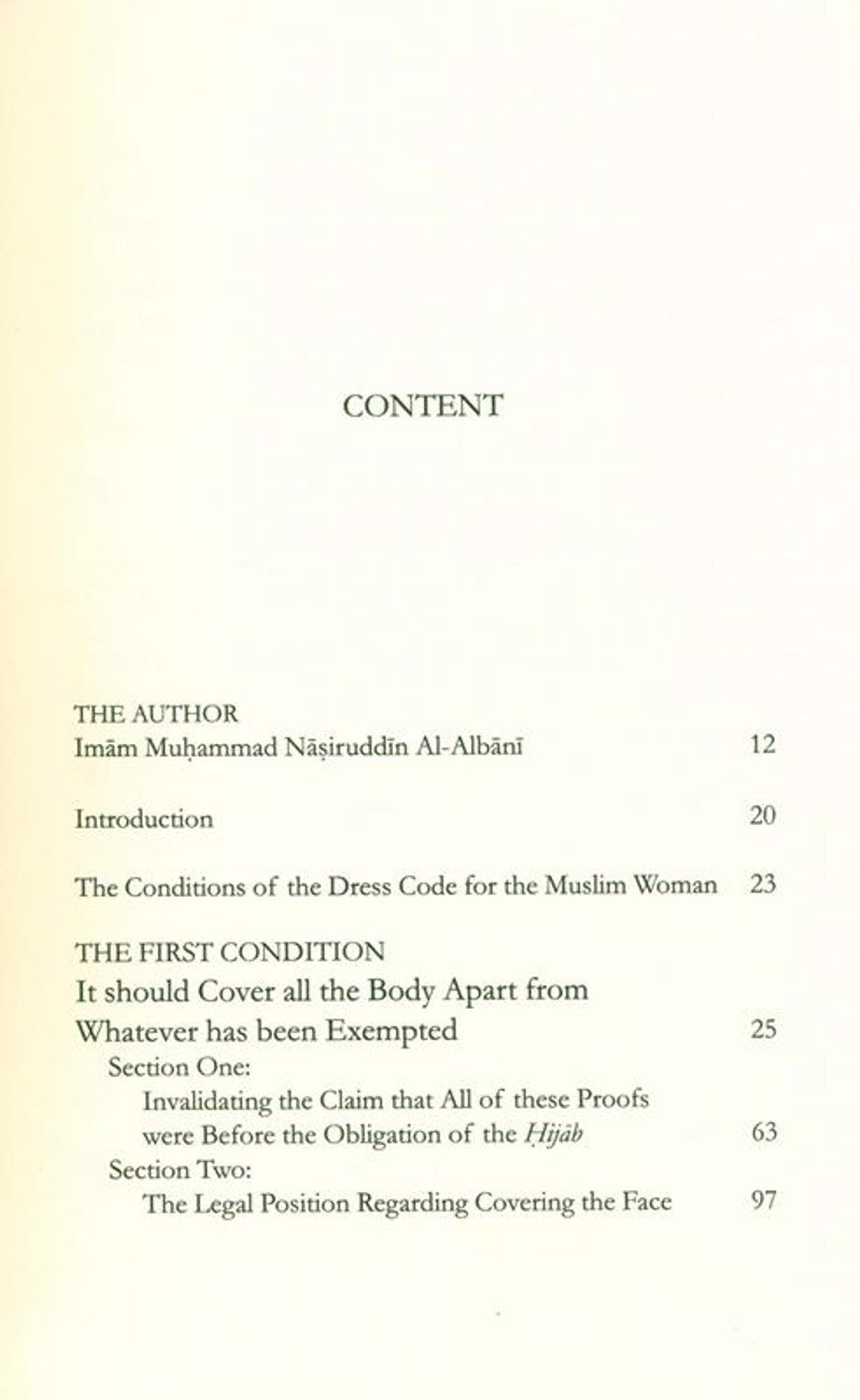
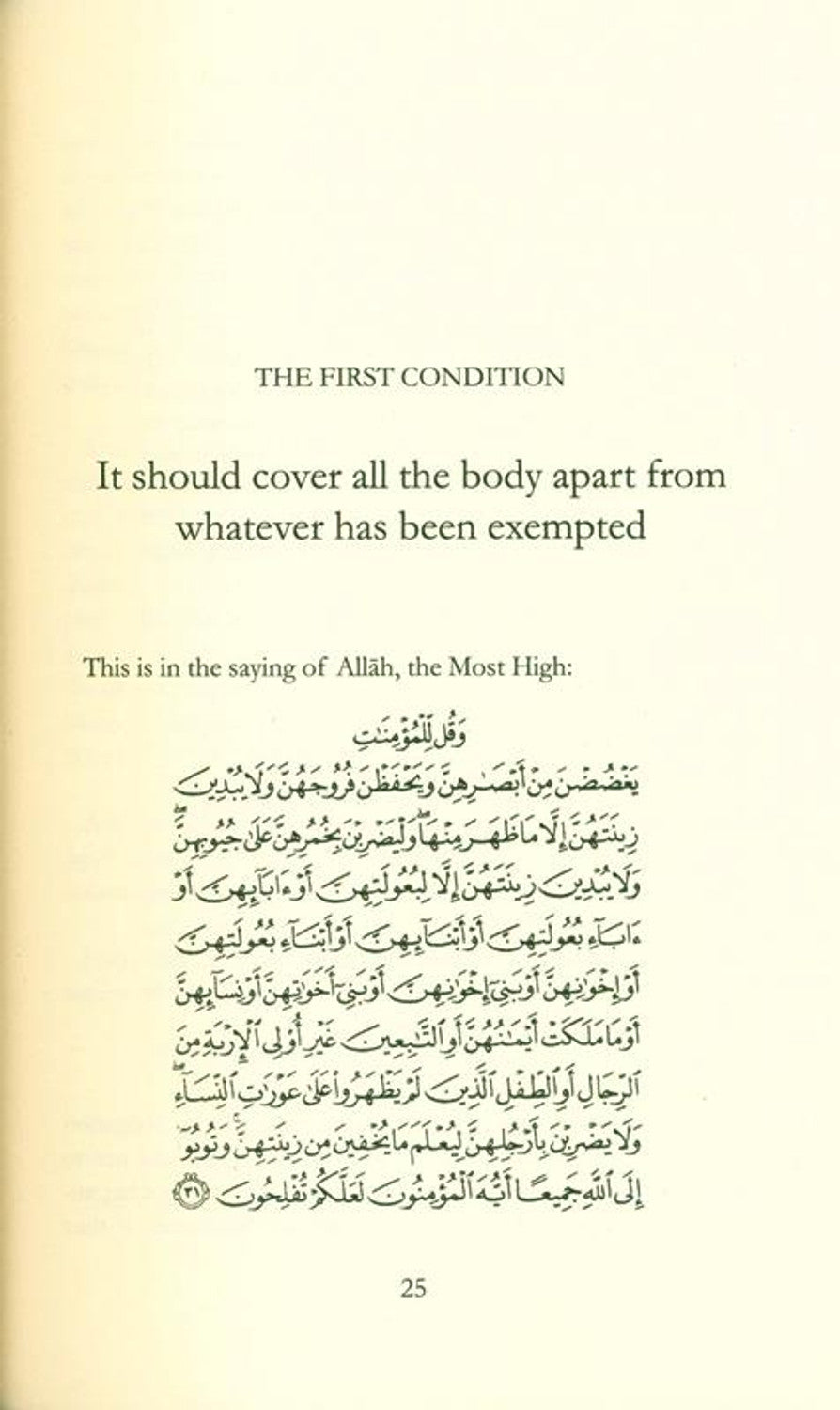
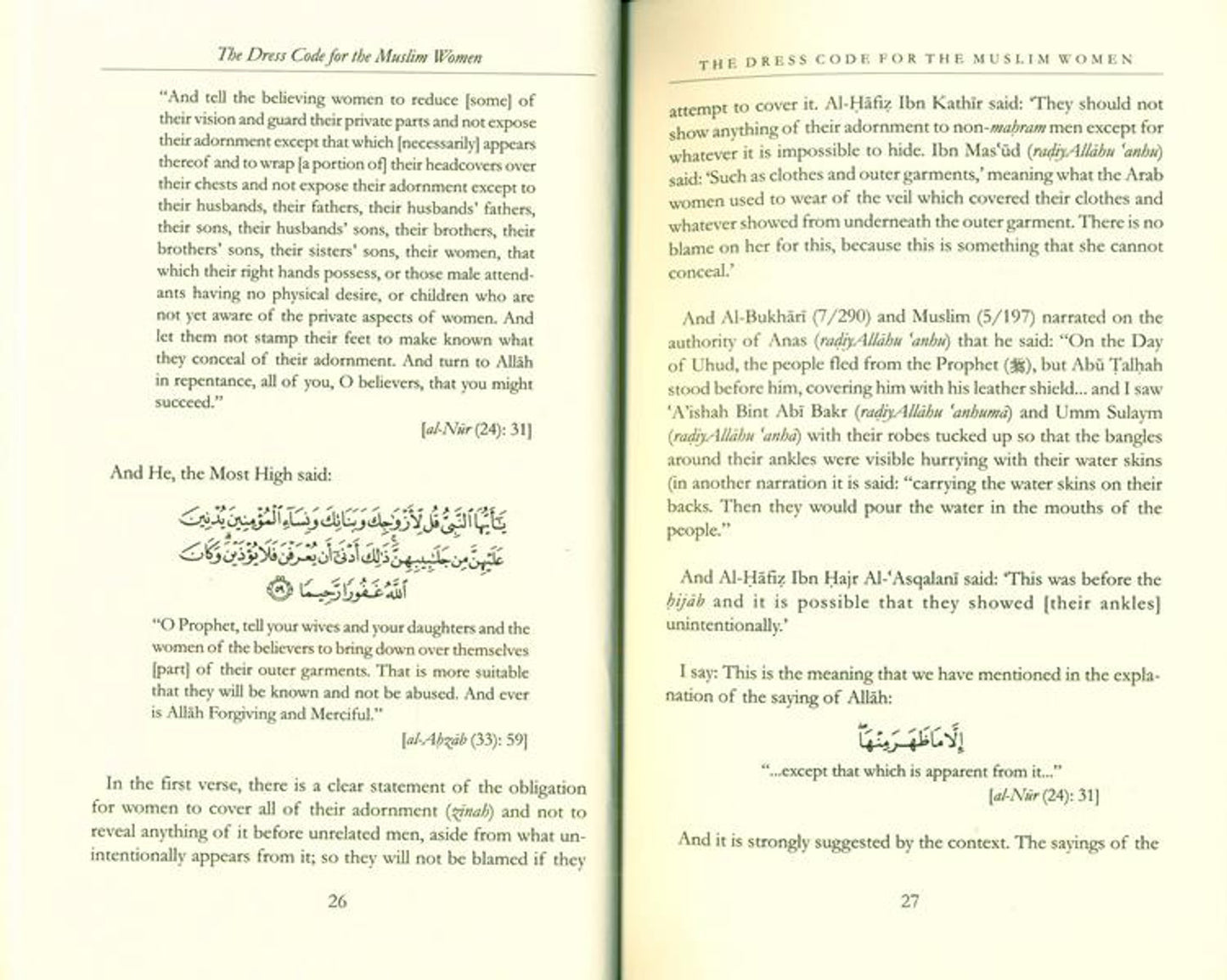
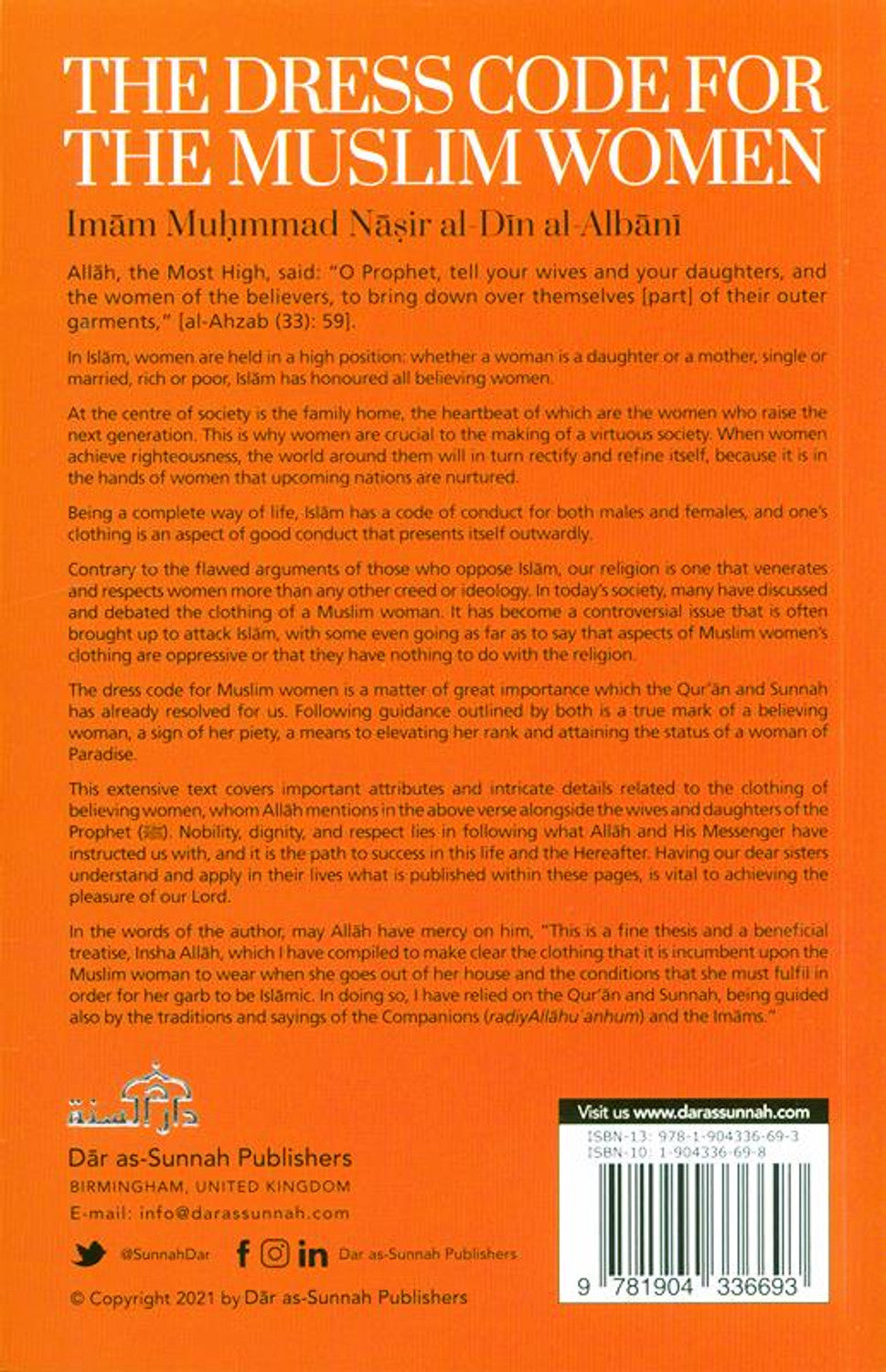
Collapsible content
Description of Book
The Dress Code for Muslim Women in the eyes of Allah is a highly esteemed matter, as stated in the verse “O Prophet, tell your wives and daughters, and the women of the believers, to bring down over themselves [part] of their outer garments,” [al-Ahzab (33): 59]. In the Islamic faith, all women are held in high regard, regardless of their status as a daughter or mother, single or married, rich or poor. Women play a vital role in society as nurturers of the next generation, making them crucial to the development of a virtuous and righteous society. With a code of conduct for both men and women, Islam places great importance on outward appearance, and following this guidance is a sign of piety and a means to attain a high status in the eyes of Allah. This thorough text covers the necessary attributes and detailed guidelines for a believing woman's clothing, in accordance with the Qur'an and Sunnah. It is important for our sisters to
Publisher
Dar As Sunnah Publications
Author
- Sheikh Nasir-ud-din Albaani
Sample Pages - Content
Page : 01
THE DRESS CODE FOR THE MUSLIM WOMEN IN THE QUR'AN AND THE SUNNAH Imām Muḥmmad Nasir al-Din al-Albānī دار السنة
Page : 02
CONTENT 12 20 23 25 25 THE AUTHOR Imam Muhammad Nasiruddin Al-Albānī Introduction The Conditions of the Dress Code for the Muslim Woman THE FIRST CONDITION It should Cover all the Body Apart from Whatever has been Exempted Section One: Invalidating the Claim that All of these Proofs were Before the Obligation of the Hijab Section Two: The Legal Position Regarding Covering the Face 63 97 35
Page : 03
THE FIRST CONDITION It should cover all the body apart from whatever has been exempted This is in the saying of Allah, the Most High: وَقُل لِّلْمُؤْمِنَاتِ يَغْضُضْنَ مِنْ أَبْصَرِهِنَّ وَيَحْفَظْنَ فُرُوجَهُنَّ وَلَا يُبْدِينَ زِينَتَهُنَّ إِلَّا مَا ظَهَرَ مِنْهَا وَلْيَضْرِ بْنَ بِخُمُرِهِنَّ عَلَى جُيُوبِهِنَّ وَلَا يُبْدِينَ زِينَتَهُنَّ إِلَّا لِبُعُولَتِهِنَّ أَوْ ءَابَا بِهِنَّ أَوْ اباءِ بُعُولَتِهِنَّ أَوْ أَبْنَ بِهِنَّ أَوْ أَبْنَاءِ بُعُولَتِهِنَّ أَوْ إِخْوَانِهِنَّ أَوْ بَنِي إِخْوَانِهِنَّ أَوْ بَنِي أَخَوَتِهِنَّ أَوْ نِسَا بِهِنَّ أَوْ مَا مَلَكَتْ أَيْمَنُهُنَّ أَوِ التَّبِعِينَ غَيْرِ أُولِي الْإِرْبَةِ مِنَ الرِّجَالِ أَوِ الطِّفْلِ الَّذِينَ لَمْ يَظْهَرُوا عَلَى عَوْرَاتِ النِّسَاءِ وَلَا يَضْرِبْنَ بِأَرْجُلِهِنَّ لِيُعْلَمَ مَا يُخْفِينَ مِن زِينَتِهِنَّ وَتُو إِلَى اللَّهِ جَمِيعًا أَيُّهَ الْمُؤْمِنُونَ لَعَلَّكُمْ تُفْلِحُونَ ) 25
Page : 04
The Dress Code for the Muslim Women "And tell the believing women to reduce [some] of their vision and guard their private parts and not expose their adornment except that which [necessarily] appears thereof and to wrap la portion of] their headcovers over their chests and not expose their adornment except to their husbands, their fathers, their husbands' fathers, their sons, their husbands' sons, their brothers, their brothers' sons, their sisters' sons, their women, that which their right hands possess, or those male attend- ants having no physical desire, or children who are not yet aware of the private aspects of women. And let them not stamp their feet to make known what they conceal of their adornment. And turn to Allah in repentance, all of you, O believers, that you might succeed." And He, the Most High said: [al-Nur (24): 31] ياتها النَّبِيُّ قُل لِأَزْوَجِكَ وَبَنَاتِكَ وَنِسَاءِ الْمُؤْمِنِينَ يُدْنِينَ عَلَيْهِنَّ مِن جَابِيبِهِنَّ ذَلِكَ أَدْنَى أَن يُعْرَفْنَ فَلَا يُؤْذَيْنَ وَكَانَ اللَّهُ غَفُورًا رَّحِيمًا لله "O Prophet, tell your wives and your daughters and the women of the believers to bring down over themselves [part] of their outer garments. That is more suitable that they will be known and not be abused. And ever is Allah Forgiving and Merciful." [al-Ahzab (33): 59] In the first verse, there is a clear statement of the obligation for women to cover all of their adornment (inah) and not to reveal anything of it before unrelated men, aside from what un- intentionally appears from it; so they will not be blamed if they 26 THE DRESS CODE FOR THE MUSLIM WOMEN attempt to cover it. Al-Hafiz Ibn Kathir said: "They should not show anything of their adornment to non-mahram men except for whatever it is impossible to hide. Ibn Mas'ud (radi Allahu 'anhu) said: 'Such as clothes and outer garments,' meaning what the Arab women used to wear of the veil which covered their clothes and whatever showed from underneath the outer garment. There is no blame on her for this, because this is something that she cannot conceal.' And Al-Bukhari (7/290) and Muslim (5/197) narrated on the authority of Anas (radiy Allahu 'anhu) that he said: "On the Day of Uhud, the people fled from the Prophet (), but Abu Talhah stood before him, covering him with his leather shield... and I saw 'A'ishah Bint Abi Bakr (radiy Allahu 'anhuma) and Umm Sulaym (radiy Allahu 'anha) with their robes tucked up so that the bangles around their ankles were visible hurrying with their water skins (in another narration it is said: "carrying the water skins on their backs. Then they would pour the water in the mouths of the people." And Al-Hafiz Ibn Hajr Al-'Asqalani said: "This was before the hijab and it is possible that they showed [their ankles] unintentionally." I say: This is the meaning that we have mentioned in the expla- nation of the saying of Allah: إِلَّا مَا ظَهَرَ مِنْهَا "...except that which is apparent from it..." [al-Nur (24): 31] And it is strongly suggested by the context. The sayings of the 27
Page : 05
THE DRESS CODE FOR THE MUSLIM WOMEN Imam Muhmmad Nasir al-Din al-Albāni Allah, the Most High, said: "O Prophet, tell your wives and your daughters, and the women of the believers, to bring down over themselves [part] of their outer garments," [al-Ahzab (33): 59]. In Islam, women are held in a high position: whether a woman is a daughter or a mother, single or married, rich or poor, Islam has honoured all believing women. At the centre of society is the family home, the heartbeat of which are the women who raise the next generation. This is why women are crucial to the making of a virtuous society. When women achieve righteousness, the world around them will in turn rectify and refine itself, because it is in the hands of women that upcoming nations are nurtured. Being a complete way of life, Islam has a code of conduct for both males and females, and one's clothing is an aspect of good conduct that presents itself outwardly. Contrary to the flawed arguments of those who oppose Islam, our religion is one that venerates and respects women more than any other creed or ideology. In today's society, many have discussed and debated the clothing of a Muslim woman. It has become a controversial issue that is often brought up to attack Islam, with some even going as far as to say that aspects of Muslim women's clothing are oppressive or that they have nothing to do with the religion. The dress code for Muslim women is a matter of great importance which the Qur'an and Sunnah has already resolved for us. Following guidance outlined by both is a true mark of a believing woman, a sign of her piety, a means to elevating her rank and attaining the status of a woman of Paradise. This extensive text covers important attributes and intricate details related to the clothing of believing women, whom Allah mentions in the above verse alongside the wives and daughters of the Prophet (). Nobility, dignity, and respect lies in following what Allah and His Messenger have instructed us with, and it is the path to success in this life and the Hereafter. Having our dear sisters understand and apply in their lives what is published within these pages, is vital to achieving the pleasure of our Lord. In the words of the author, may Allah have mercy on him, "This is a fine thesis and a beneficial treatise, Insha Allah, which I have compiled to make clear the clothing that it is incumbent upon the Muslim woman to wear when she goes out of her house and the conditions that she must fulfil in order for her garb to be Islamic. In doing so, I have relied on the Qur'an and Sunnah, being guided also by the traditions and sayings of the Companions (radiyAllahu anhum) and the Imams." السنة Där as-Sunnah Publishers BIRMINGHAM, UNITED KINGDOM E-mail: info@darassunnah.com @SunnahDar fin Dar as-Sunnah Publishers Copyright 2021 by Där as-Sunnah Publishers Visit us www.darassunnah.com ISBN-13: 978-1-904336-69-3 ISBN-10: 1-904336-69-8 9781904 336693
Sheikh Nasir-ud-din Albaani
Sheikh Nasir-ud-Din al-Albani (1914–1999) was a prominent 20th-century Islamic scholar known for his expertise in hadith sciences. Originally from Albania and later residing in Syria, he became a respected authority in authenticating hadiths and was largely self-taught. His major works, like Silsilat al-Ahadith as-Sahihah (The Series of Authentic Hadiths) and Silsilat al-Ahadith ad-Da'ifah (The Series of Weak Hadiths), aimed to help Muslims distinguish authentic prophetic traditions. Al-Albani’s rigorous methodology in hadith criticism and his advocacy for following authentic sources significantly influenced contemporary Islamic thought, especially within Salafi circles.





